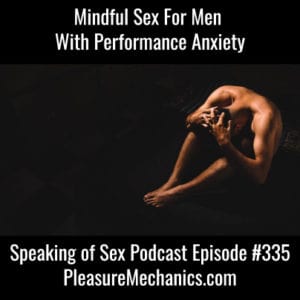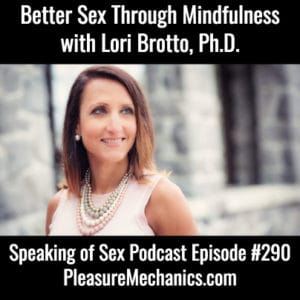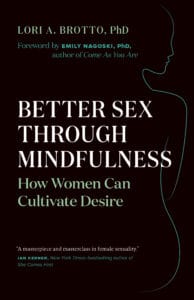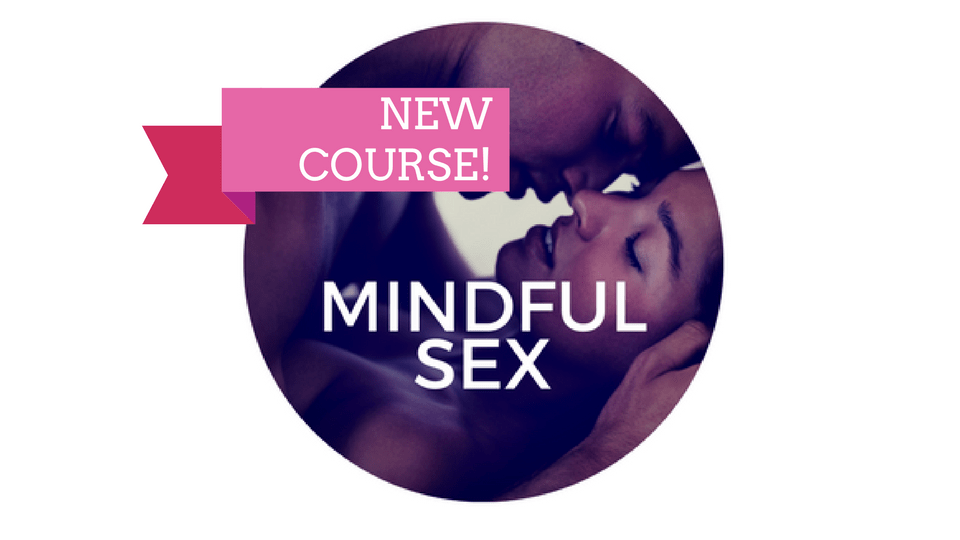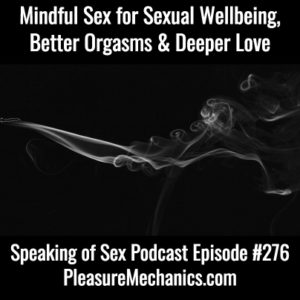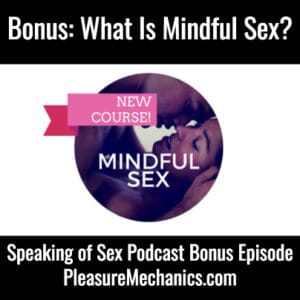Podcast: Play in new window | Download

Savoring is the art of slowing down a moment enough to be fully in it, while it is happening, with presence and gratitude. Fully savoring pleasures of all kinds – from small sensual pleasures to the deepest joys of intimacy and connection – is a skill set that we humans can develop, on purpose, over time.
The Science of Well-Being course from Yale highlights savoring as an essential practice for overall well-being and happiness:
Savoring is the act of stepping outside of an experience to review and appreciate it. Often we fail to stay in the moment and really enjoy what we’re experiencing. Savoring intensifies and lengthens the positive emotions that come with doing something you love. ~ The Science of Well-Being
The practice of Savoring can bring a full body positive experience, create lasting benefits for our entire being, and create meaningful bridges between people through shared experiences of pleasure. Savoring, when practiced consistently over time, develops our ability to feel more pleasure and joy – these positive body states become easier to access and we are able to drop deeper into our experiences. In a very practical way, Savoring is the practice of expanding our capacity for feeling.
In this podcast episode, we share the why and how of Savoring – why it is such a powerful practice and how to put it into action in your life. For more pleasure practices and support in deepening your pleasure capacity, join us in the Mindful Sex online course.
Love the show? Show your love and support our work at PleasureMechanics.com/love
Resources Mentioned On This Episode:
Mindful Sex Online Course : Join us in exploring how to manage erotic distractions, stay present during sex and explore your erotic potential. This link is preloaded with a podcast listener only discount to the online course.
Rick Hanson, Ph.D. Explore the neuroscience of well-being and connection
Yale University’s Free Online Course The Science of Well-Being
Podcast Transcript:
Podcast transcripts are generated with love by humans, and thus may not be 100% accurate. Time stamps are included so you can cross reference or jump to any point in the podcast episode above. THANKS to the members of our Pleasure Pod for helping make transcripts and the rest of our free offerings happen! If you love what we offer, find ways to show your love and dive deeper with us here: SHOW SOME LOVE
Chris Rose: 00:00 Welcome to Speaking of Sex with the Pleasure Mechanics. I’m Chris.
Charlotte Rose: 00:05 I am Charlotte.
Chris Rose: 00:06 We are The Pleasure Mechanics and on this podcast we have honest, soulful conversations about every facet of sexuality, love, relationships, fantasy, desire, how it shows up in your lives. We are 360 some episodes deep into this conversation, so thank you to all of those who have been listening for years perhaps and welcome to all of our new listeners. Because we have a lot of new listeners every week now, so we welcome you on board. Come on over to pleasuremechanics.com ,where you will find our complete podcast archive or explore the podcast feed in your favorite podcast app. And definitely come over to pleasuremechanics.com/free where you can find ways of going deeper with us and joining our free online courses and being in touch via email so we can provide even more resources to you. That’s pleasuremechanics.com/free.
Chris Rose: 01:12 On today’s episode, we are going to be talking about a skill that is such a beautiful skill. It’s like almost a, I don’t know, it feels like less romantic to call it a skillset. But it was a skill I was reminded of both because… So last week we talked about micro pleasures and this idea of seizing 60 second pleasure points throughout our day, and that was a couples therapy exercise that we started the new year with. And we heard from some of you that said, “Oh, this structure is giving me so much life. I’m definitely noticing these little pleasures throughout my day. Thank you for this.” And then some of your emails said things like, “I noticed that I’m waiting for the 60 seconds to be up.” Or, “I’m finding myself noticing how excruciatingly slow 60 seconds can be. I’m not really finding things to enjoy.” Or, “Once I’m enjoying it, I don’t know how to stick with it and 60 seconds feels so long when you start to notice.”
Chris Rose: 02:18 So this brought me to this skillset called savoring. And then, synchronistically, I joined this year an online course from Yale University called the Science of Wellbeing. I will link to it in the show notes page. It’s actually a free offering from Yale as an online course. And I love these online courses because I try to stay up on how science is talking about things like wellbeing and happiness and connection and love and then map that into kind of our erotic wisdom as a community from the past 10 years plus.
Chris Rose: 02:58 And the first lesson of the year in their offering to the public about the science of wellbeing and happiness was practice number one, savoring. And so of course then I immediately forwarded that to Joe Kramer, who is our teacher of erotic massage because it struck me immediately that Charlotte and I have both been practicing this fine art of savoring, this skillset of savoring, for over a decade together because we were invited into the skillset through erotic massage from Joe Kramer. Who, part of his erotic practice, so you build up all this erotic energy, you build up this full body orgasm, you have this breath practice, you have a climax and then you savor. Built into our structure was this act of savoring and being in that afterglow after the climax. And Joe of course, wrote me back. He was like, “Yes, of course. I’ve been talking about this for decades.” And I was like, “I know. That’s why I forwarded this to you.”
Charlotte Rose: 04:13 I remember so clearly sitting in a classroom with him sharing this idea and saying that this is an erotic skill that we need to cultivate, the skill and art of savoring. And it’s such a beautiful word. It’s such a beautiful idea. And it’s something that can be practiced day by day, moment to moment, out in our regular life as a training ground for when we get into the bedroom and when we’re having erotic experiences, we can then have that skill more firmly locked into our body. It’s such a beautiful skill to practice, in and out of the bedroom.
Chris Rose: 04:55 So let’s talk about this skill. What does savoring mean? Because as you say, it’s not only something we can practice and build our capacity around, Yale University science says that it’s one of the most important skills for wellbeing. So why is this? What is savoring?
Chris Rose: 05:13 Savoring is the act of stepping even deeper into a pleasurable moment, noticing that it is happening as it is happening and installing that pleasurable moment into your physiology, into your neurology, into your lived experience, so your system learns from it. So it’s the act of capturing pleasurable moments. So instead of becoming very fleeting, they are deeply felt and remembered and lodged in your body. This turns out to be super important for our overall wellbeing is how well we are able to saver pleasures. And pleasures, very small sensory pleasures to very big pleasures of joy and connection with other human beings. The full range of pleasurable experience, how much we are able to pay attention to it as it is happening, how deeply we are able to feel it and how much we can remember and rejoice in it afterwards, turn out to be major factors in our lifelong wellbeing and happiness and access to joy.
Chris Rose: 06:35 We’re going to talk more about this, but it turns out the more you install joy and pleasure, the easier it is to feel those things. And the way we do this is we pay attention to it as it is happening. It is a practice. So wherever you are in your experience of being able to experience joy, you can build your capacity through practice. And this is science, babies. This is both ancient wisdom and knowledge, right? That we have to practice our capacity for these things. And this is backed by science that this has some of the most direct tangible results, not only in our overall well being in happiness, but in our overall wellbeing in health.
Chris Rose: 07:21 It does things like boost the immune system and protect heart health and give you deeper sleep. Surprise, it makes us more at ease humans, right? When we systematically, on purpose, practice pleasure and joy. So savoring. Why is it important? How do we practice it? What does it give us access to? How does it accumulate over time? I want to turn this over to the queen of savoring. Because when I think of savoring, Charlotte, you are so good at this skill.
Charlotte Rose: 07:57 I feel like it is a central organizing principle of my days.
Chris Rose: 08:03 Yes.
Charlotte Rose: 08:04 But there’s just so much joy to be soaked out of simple, mundane moments and I find myself really enjoying them. And I think as the science points out that the more you do it, the easier it becomes. So it becomes sort of a natural part of your vocabulary.
Chris Rose: 08:24 So you have mastery over this skill?
Charlotte Rose: 08:26 I do feel like I do. And it creates a lot of joy and pleasure and simple fulfillment.
Chris Rose: 08:33 Yeah. One of the ways this has shown up for us socially, is during a meal you are what I call a multi cheers-er. Like we’ll have a cheers at the beginning of a meal and draw attention to how grateful we are to be there together and how lovely this is and we’ll all clink glasses. And then like five or 10 minutes later, you’ll raise your glass again and then 10 minutes later. And I’ve teased you for this, but what you’re doing is drawing our attention back to this moment, how pleasurable it is, how wonderful it is, how grateful we should be to be there. And this is exactly the science of savoring.
Chris Rose: 09:13 So the science of savoring tells us that we need to either create a pleasurable experience, a joyful moment, or a moment of joyful social connection or seize upon it when it happens to us spontaneously. So we need to find ourselves or create a pleasurable moment, be in it as it is happening. So draw more of our attention and go deeper into the moment. Put it in context and find gratitude for the moment, recognize that it is a blessing, that this moment is even happening. And then you feel it deeply.
Chris Rose: 09:53 So you’re in the moment. You draw attention to the moment. You create context and gratitude for the moment and you feel it as deeply as you can. And it turns out what this does is it installs the good into your system. And this is the language of Dr. Rick Hanson, who’s a neuroscientist, PhD, Buddhist teacher. I love him. We really get a lot out of learning with him. But he talks about installing the good, letting the good in. And what this does is it takes pleasure from being a fleeting moment to a learned capacity. You install it into your system and get the benefits of that pleasurable moment and over time the accumulation of this does quite miraculous, wonderful things for our systems it turns out. So this is a central skill we want to invite you into, savoring. Savoring.
Charlotte Rose: 10:55 Also, just a note that even if there’s nothing that awesome going on in your life right this minute, you can also gain these benefits by paying attention to a memory. Your body doesn’t totally know the difference. And so if you take a moment to remember something that brings you joy or pleasure or connection and then really experience it, stay with it for a few seconds longer until you get some feeling states in your body that feel good, that has an impact on your biology as well. Which is great to remember, and a wonderful tool.
Chris Rose: 11:32 Well it’s kind of a super power that pleasure can bring us all of these benefits, not only in the moment it is experienced, it can connect us and weave us with other human beings by sharing it together. And it can be recalled later to offset, to trigger, a positive hormonal cascade in your body down the road. These become assets in your body, in your psyche, these pleasurable moments of feelings deeply felt and shared.
Chris Rose: 12:06 So this can happen alone. You can deeply savor. And I’ll often turn the corner and find Charlotte deep in a moment of pleasure, completely on her own. You can savor moments alone, because truly we’re never alone. We experience these moments with the entire universe. And for me it’s often, especially after I’ve shaven my head, a freshly shaved head, the wind on the back of my neck can feel like an orgasm with the universe.
Chris Rose: 12:34 So we can savor all of this pleasure just out in the world, but we can also share it together. And the science actually supports this, that by sharing these moments of pleasure, and this is what we were kind of talking about in the micro pleasures episode, creating bridges between people with shared pleasures. The act of sharing a pleasure actually helps you install it as well. It is a form of savoring. So feeling the experience deeply in your body, sharing it, feeling gratitude for it, all of this taps into our ability as humans to learn. And so what we are doing very deliberately is learning pleasure. And our Twitter handle for like 13 years, because back when Twitter started there was a character limit, so our Twitter handle instead of pleasure mechanics was learned pleasure was the phrase that we have been riding behind. We don’t even use Twitter anymore. I don’t know why I mentioned that.
Chris Rose: 13:34 But learned pleasure has been this phrase that for me has always been really important because… So for Charlotte she was a natural pleasure connoisseur, a bon vivant. She grew up saturated in pleasure and global travel and safety and learning how to feel joy and pleasure and connection very deeply. I did not. I came to this work, very stripped of pleasure and with a very low capacity to feel pleasure. I would hit pleasure anxiety very quickly. We all have these capacities for pleasure and our systems are literally wired and capable of feeling certain feelings. They have capacities for emotions and feeling states. And if you hit your capacity, you often trigger into anxiety or fear or numbness or shutdown or dissociation. And so this can show up for us in all different ways.
Chris Rose: 14:33 But I came into sex education from the wounded healer place. I was abused as a kid. I grew up in an abusive home. And I wanted to feel more, I wanted to feel more pleasure. And I had just enough touch with it honestly through masturbation that I knew what was available to me and I was kind of like a hungry seeker. Like, “Teach me how to learn pleasure.” And I found erotic massage and erotic breath work and all my work with Joe Kramer and Sexological Bodywork and then Pleasure Mechanics and this 10 years of practice as this community and all of the work we do together.
Chris Rose: 15:11 And I have learned over the past decade how to feel pleasure, how to run more pleasure, how to expand my pleasure capacity. And that has happened over time practicing this. And I think so much of it as being in partnership with you because we’ll be, for example, at a beautiful sunset, we’ll be driving, there’ll be this beautiful sunset, we’ll pull the car over, we’ll get out and we’ll start looking at it and I’ll be like, “Cool, let’s go.” And you’ll be like, “What? It’s still going on. Stay with it.” And I’ll be like, “Okay, so what do you want to talk about?” And you’ll be like, “We’re looking at the sunset.” Like you can just stay in the joy and pleasure, whether it’s the food or the sunset or the sex, right? The orgasmic state. You can stay in that for so long.
Chris Rose: 16:06 And I really want to draw our attention here that we can all learn this. We can slowly expand our capacity around this and how we learn it. So going back to the Yale science, the practice they recommended is once a day, one pleasure, really feel it as deeply as you can. Expand it a little bit in duration, if possible. Share it, if possible, and then log it. They have an app you can log it in, but you can also just log it down in a journal or really just in your memory. As you’re going to bed, what was the most pleasurable moment of your day? Feel it. Remember it.
Charlotte Rose: 16:47 One of the images that stuck with me from Rick Hanson was this, “Adding even just a few beads of joy changes the whole necklace of seconds that make up your day.” I feel like that’s a useful image that just taking a moment to savor something deeply throughout the day will shift your day.
Chris Rose: 17:07 So he’s talking about that even on mundane days, even on days filled with despair, right? Because he’s recognizing a lot of us have a lot of stress, anxiety, fear, despair, rage, in these moments. And even in those times, it is even more important to practice this and to turn on purpose towards joy. Because part of this too, and I think we should do a whole other episode on this because it’s important and it shows up in very interesting and unexpected ways around sex, is the negativity bias. In human psychology, in human physiology, we are to pay much more attention to the threats, to our survival than to the yummy treats in our days.
Chris Rose: 17:59 And this makes sense from the evolutionary perspective, when we are really literally just surviving as animal bodies, we need to pay attention to the threats to our survival. We need to learn the dangers and teach one another about the dangers, which mushrooms not to eat. And remember the alarm in our system around those things. But now in today’s modern world, we are now threat tracking machines and positive experience can wash over us. Rick Hanson, we’re quoting a lot of Rick Hanson today. We love him. Rick Hanson talks about it like our neurology is Velcro for the negative and Teflon for the positive.
Chris Rose: 18:47 And we know this in our bodies. Think about an average day. One bad thing can happen to you… On an average day full of joys, full of pleasures, full of sensory pleasure, waiting to be savored. One bad thing happens to you and what do you come home raging about? What do you go to bed thinking about? And all of that time you are cycling around on that negative thing, on that threat to your existence, on that annoying person at work, all of that negativity cycles in your brain are throwing off stress hormones, are throwing off cortisol are keeping you in that fight or flight mode and this is an anti-erotic.
Chris Rose: 19:30 This is one of those forces in our lives that when we think about like, “Why aren’t I more interested in sex? Why can’t I connect more deeply with my partner? Why aren’t I more available for orgasm? Why do I get distracted during sex?” All of these struggles for so many of us are informed by the fact that our systems are threat tracking all day long. Every day we’re saturated in it. A lot of people have trouble sleeping because our systems are not resetting from the stress cycles. Our systems are not getting practice, are not getting time, are not getting the opportunities to feel pleasure, joy, relaxation, connection, comfort, let alone ecstasy, euphoria, bliss, rapture. All of these positive states our human bodies our capable of and want to be in. Want to be in.
Chris Rose: 20:24 So what do we do? We practice it on purpose. We do it on purpose, we learn how to savor. We install the positive moments throughout our day. And low and behold, it gets easier. We learn how to expand those moments and drop deeper into them, right? These two vectors of duration and depth of engagement and we have more access to them in our systems. And we can all follow Charlotte into the lands of pleasure. Take us.
Charlotte Rose: 21:01 Come with me. Come with me. Yeah, and it’s this idea, I just love this idea that it’s a simple practice that we can be with and we can cultivate. And then it is laying the foundation within our bodies that for the moments where we’re having peak erotic experiences, we’re in a 45 minute athletic sex act, and we have trained ourselves to pay attention. We’ve trained ourselves to be with the sensations, to be really enjoying what’s happening and focusing on the enjoyment instead of all of the concerns and distractions that’s also very human.
Charlotte Rose: 21:40 So we are training ourselves to be able to enjoy life and sex more deeply. And that will change the course of your life slowly over time. These moments like savoring a sunset is not going to change your life in that moment, but cumulatively doing this again and again over every day is going to change the arc of your next decade. And so it is a very powerful, simple, easy skill to cultivate.
Chris Rose: 22:08 Well one of the big why’s that the science gives for why savoring is so important, why it creates so much positive uplift over time, why it is so cumulative, is because it thwarts what they call hedonic adaptation. Hedonic adaptation is, on a pure sensory level, it means you can’t really feel the clothes you are wearing in every moment. Your sensory nerve endings get kind of used to that stimuli and then adapt and await new stimuli, so you can feel the bug landing on your face. So we adapt to what is normal and we kind of normalize what is repeated. And on the bigger level of our lives, this accounts for things like why we always want to shop for new shit. We buy a new object, it gives us a moment of pleasure, we normalize its presence in our life and then we begin seeking something new.
Chris Rose: 23:07 We seek novelty, we seek new stimuli. That’s just part of who we are as sensory beings. And science points to hedonic adaptation as a source of suffering. It’s part of the reason we get restless in good situations and it’s part of the reason we can’t feel grateful for the abundance that we have available to us. So what do we do to thwart hedonic adaptation? We learn how to savor. When we talk about slowing things down. When we talk about really being deeply in the erotic moment.
Chris Rose: 23:42 Part of sexual suffering is we’re always for the next big thing, the next novel thing, the next big hit of the pleasure hormones of oxytocin, of dopamine, of those hormones in us that say, “Ooh, fun. Good. Yes. Delicious. Yummy.” New, novel experiences hit those buttons really well. Daily pleasures do not because of hedonic adaptation. The antidote to this is paying attention, is savoring. Because when you really slow down in your day to day life and bring your full attention to that house plant that is just right in bloom and bring your full attention to it and literally stop what you are doing to fully immerse yourself in that experience. And then maybe remember your friend who gave you that house plant, right? You give it context, you lean in for a sniff, you give yourself that full sensory immersion. You maybe stroke a nice glossy leaf, right? You’re having an erotic… If it sounds sensual and erotic, it’s because it is.
Chris Rose: 24:54 Savoring is a deeply erotic experience if we go to Audrey Lord’s definition of the erotic as feelings deeply felt and shared. So you’re having a moment of savoring with that house plant and that thwarts hedonic adaptation. It brings that moment of pleasure, of joy, of wonder, back into that moment of your life, of passing through your hallway.
Charlotte Rose: 25:21 And then that positive moment will affect your biology for two to four hours afterwards is what the science is saying. So these moments really do accumulate in our day and make a difference.
Chris Rose: 25:33 And so what the Yale studies don’t mention are the erotic benefits of this, right? We know the health benefits, the overall wellbeing benefits. Savoring, when you learn how to savor, and Charlotte hinted at this earlier, becomes an erotic super power. Because it allows you to drop in and deepen your experience of whatever is happening to your erotic body. And instead of this novelty seeking, like we need the new lingerie, we need the new position, we need the new kink, which is fine, novelty seeking is an important part of eroticism too, but so is depth of engagement. And depth of engagement…
Chris Rose: 26:14 Actually bringing it back to Joe Kramer. I remember him talking about how deep can we go, so if someone is just massaging your toe, you can feel it throughout your body, right? You bring your full attention to whatever is happening in your erotic touch. Someone is fucking you, licking you, kissing you, touching you, whatever is happening to you, or you’re playing by yourself or you’re out in nature and that wind is hitting you just right. Whatever is happening to your body, if you can feel that moment deeply, it just… I get what wordless. If you feel these moments deeply, the universe is available to you erotically. Meaning there’s no…
Charlotte Rose: 27:02 There’s no limit to the erotic stimulation that is out in the world.
Chris Rose: 27:06 There’s no limit to the pleasure we can feel, right? Yes.
Charlotte Rose: 27:08 Yeah, the universe can be your lover in each and every moment or many moments of the day.
Chris Rose: 27:14 Or you find the universe in your lovers touch, right? So like the universe is your lover. Yes, all of the stimuli can be deeply erotically felt, but what I was trying to say is like when your lover is touching you, if you are truly feeling it, your whole body yearns for this. And so when a lover touches you with love and care and reverence, or you get a kiss from a stranger that you want or whatever that moment is, when we start paying attention, the full body response is really fun to pay attention to because it’s not just that one part of your body being touched, your whole body lights up.
Chris Rose: 27:52 Even just thinking about one of your peak erotic experiences. Think about one of your peak erotic experiences and then start noticing those flicks of arousal and desire and want in your body. The more we can pay attention to this and come home to it and make space for it and learn pleasure, and in this case learn erotic pleasure, learn sexual pleasure, learn arousal, the bigger we can go, the deeper we can go with it. So this is literally what we’re talking about when we say learned pleasure, is installing the fuck out of these moments when things feel good and right.
Chris Rose: 28:32 This is a lot of the experience we welcome you into in the Mindful Sex course. So if you are saying yes to this, if your body is responding to this conversation with like a, “Mmm, this feels good, I want more”, notice that in your body and come over to pleasuremechanics.com/mindful where you will find the best deal currently on our Mindful Sex course. Enroll with us and start practicing with us. This course is full of practices where you can put your attention on purpose to different parts of your erotic experience to start learning some of these skills together.
Charlotte Rose: 29:12 Our culture is so focused on good sex being about what’s done to us, but the other piece of that equation is how deeply we can feel what is happening to us. And so when we cultivate both of those skillsets, we’re going to have a really dramatically different experience of sex because there’s so many more skills in that bedroom.
Chris Rose: 29:36 I just wanted to make like a cartoon like, “Pew, pew, superpowers engaged.” And that’s really what we’re doing. We are tuning into our human superpowers and why we called ourselves Pleasure Mechanics in the first place all of those years ago, my love, was to really draw attention to the mechanics of pleasure in the human body. What are we designed to do when it comes to pleasure, orgasms, fucking, loving, connecting, creating with one another. What are we designed to do? What does the body tell us is possible? Let’s play there together.
Chris Rose: 30:13 All right, I think enough for today. Let us know your experiences of this. We love hearing your stories about how this work lands for you. All we can do on this podcast and through our courses is invite you deeply into practices, kind of lay out the why and the how and let you know what other people are experiencing and then it’s kind of turned over to you to put this into practice in your life and our aim is to help you make that as easy as possible. To try to make it really simple to opt into exploring some of these things for yourself and then ask you to report back to us.
Chris Rose: 30:56 How do these things emerge for you? What shows up as you engage with these practices? And this year and beyond we’re going to start formalizing this a little bit and collecting these stories from you. So if at any point you have something to say to the Pleasure Mechanics community, we are over 10,000 strong around the globe listening and engaging with this podcast. If there’s something you want to share, either a question to be answered or a testimonial about how this is showing up for you and your life, record a voice memo on your phone and email it to us at beintouch@pleasuremechanics.com or charlotte@pleasuremechanics.com or chris@pleasuremechanics.com. Get it to us at pleasuremechanics.com and share your experience with us because we are listening and integrating these 10,000 bodies and more into this body of erotic wisdom that we’re sharing back with you. That’s how we roll here. Thank you for being a part of it.
Chris Rose: 31:59 So we will have some links on the show notes page. So whatever podcast app you are using, if you click through to the show notes page, you will find links, ways of engaging more deeply with us and with the themes of the shows. You will also find full transcripts of every show, which we are providing to increase accessibility and searchability of this show. So if there’s something you heard and want to go back and find it, you can easily do that through the transcripts. Yes.
Charlotte Rose: 32:30 Thank you to everyone who supports this show and makes this community supported erotic education possible.
Chris Rose: 32:36 Mm-hmm (affirmative). It’s important to notice we have no sponsors, we have no ads. We do not interrupt our shows with minutes of ads selling you mattresses and prescription pills and all of those things because we are community supported erotic education and we want to just provide you the most efficient, effective resources for a more erotically engaged, happy life. Yes. Help us do that. Show your love for the show at pleasuremechanics.com/love where you will find ways of going deeper with us, showing your love, supporting the show, and keeping this work going for the coming decade.
Charlotte Rose: 33:17 Mm-hmm (affirmative).
Chris Rose: 33:18 Thank you for being here with us. Send us your voice memos. Send us your love. We are sending you our love. I’m Chris.
Charlotte Rose: 33:26 I’m Charlotte.
Chris Rose: 33:27 We are The Pleasure Mechanics.
Charlotte Rose: 33:29 Wishing you a lifetime of pleasure.
